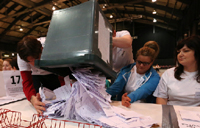UK shakeup looms after Scotland votes No
By Agence France-Presse in Edinburgh (China Daily) Updated: 2014-09-20 08:04
 |
|
Supporters from the "No" Campaign react to a declaration in their favour, at the Better Together Campaign headquarters in Glasgow, Scotland September 19, 2014. [Photo/Agencies] |
Scots rejected independence on Friday in a referendum that left the centuries-old United Kingdom intact but headed for a major shakeup that will give more autonomy to both Scotland and England.
Despite a surge in nationalist support in the final two weeks of the campaign, the "No" camp secured 55.3 percent of the vote against 44.7 percent for the pro-independence "Yes" camp.
 |
| Scots vote in record numbers |
|
 |
| Scottish voters have rejected independence |
"No" campaigners across Scotland cheered, hugged and danced as the results came in early in the morning and British Prime Minister David Cameron said he was delighted.
"It would have broken my heart to see our United Kingdom come to an end," he said outside his Downing Street offices in London, looking relieved after averting a defeat that could have cost him his job.
Many dejected "Yes" supporters watched in tears in the streets of Edinburgh.
"I don't think any of us, whenever we entered politics, would have thought such a thing to be either credible or possible," Alex Salmond, the Scottish National Party leader, who will continue to head the regional government, told supporters.
The result reassured investors worried about the economic risks of a breakup, while the pound reached a two-year high against the euro and European stock markets rallied.
The Confederation of British Industry said the result will be greeted by a "collective sigh of relief across the business community".
A "Yes" vote would have ended the Union between Scotland and England stretching back to 1707. The vote was watched closely by other separatist movements who are also clamoring for a referendum, like the Catalans in Spain.
The British government must now deliver on promises made in the heat of the campaign to give more powers over tax, spending and welfare to the devolved government in Edinburgh.
In his televised address, Cameron said he will offer all parts of the UK greater local control - heading off growing demands from right-wing Conservatives and the UK Independence Party for England to be given more powers.
"Just as Scotland will vote separately in the Scottish parliament on issues of tax, spending and welfare, so too England, as well as Wales and Northern Ireland, should be able to vote on these issues," he said.
Cameron said these new powers will be delivered "at the same pace as the settlement for Scotland", suggesting legislation will be drawn up as soon as January.
Emily St Denny, a politics professor at Stirling University, said: "Scotland gains almost everything except for full independence. The context is difficult because English and Welsh lawmakers are unhappy with the promises made to Scotland," she said.










